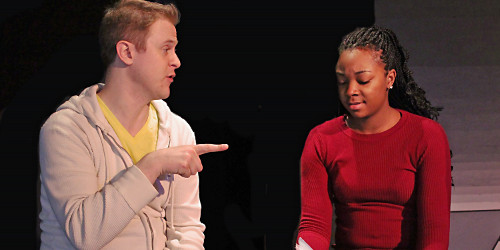By Carolyn Hayes

For good or for bad, the notion of authorship informs the way we consume art. The influence of "Uncle Tom's Cabin" (written by a white, Northern abolitionist) might have spurred citizens to action against the injustice of slavery, but the novel has also been criticized for its racist, belittling black stereotypes. "Write what you know," the maxim holds - stray, and risk being labeled inauthentic, derivative, pandering, or worse.
If there's one thing every character in playwright Jeff Talbott's "The Submission" can agree on, it's that there is no earthly explanation for how a white gay man out of Yale Drama managed to write a contemporary masterwork centered around a black mother and her card sharp son. But he has. Against all odds, Danny has penned a play that derives real, beautiful insight from a culture and experience far removed from his own, without falling to offensive tropes; it is a great play, an important play, about the black American experience. And if he puts his own name on it, he knows that no one will read it, let alone produce it.
In the production now at The Ringwald Theatre, director Lisa Melinn and company follow Danny (Richard Payton) as he schemes to foment ideal conditions for his play's success. He submits the script under a pen name, and it is accepted for a prestigious festival. Rather than risk losing his chance before being produced, Danny then elects to hire a black actress to pose as playwright in his stead. Why Emilie (Ciarah Mosley) accepts the job could be chalked up to the prospect of future profit, or connections with high-profile directors and producers; whatever the case, they enter into a professional arrangement and nascent friendship, what a person with no concept of foreshadowing might describe as a win-win scenario.
But all of the above is dispatched in a few expository scenes; the bulk of the show finds Talbott forcing his characters to see their plan through to the very end. The proceedings are inundated with a frantic energy: At first, it's elation at the accomplishment of the deception, but the laughter turns to bickering and wrath as the characters confront both creative and personal differences in the process leading up to the festival.
On the one hand, Danny struggles to stand by as his neo-Pygmalion offers her own opinions and starts to feel an ownership stake in the play she's dropped everything to cultivate; on the other, Emilie finds it difficult to be the one "in the room," defending choices that offend her to artists she reveres, especially since a sanctimonious white man told her to.
The story is given further dimension by two supporting characters: Trevor (Nate Hudson), a fellow playwright, presents a lackadaisical counterpoint to the fervent cynics around him and a heaping helping of Zen patience when wedged in the middle. As Danny's long-suffering spouse, Jeff Bobick brings a different flavor of "otherness," that of the one non-theater person in a like-minded hive.
However, the heart and the spleen of this production belong wholly to Mosley and Payton, who inhabit often-unpleasant characterizations with both generous humanity and not a whiff of hesitation. When Emilie finds herself serving as a tour guide of white privilege in an excellent tide-shifting scene, Mosley more than holds her own, executing deft code switches as respectful employee, cultural ambassador, and unapologetic advocate.
Payton, conversely, delivers a baldly selfish Danny, pointedly refusing to listen and failing to learn about himself, but the actor manages to traverse a high wire of audience favor, chiefly through a steady stream of self-deprecating zingers.
Melinn wisely coaxes the humor from each scene of the play's long single act - a much-needed release valve in a show that is otherwise hard to watch, in exactly the right way.
Abstract visuals predominate in this production, with scenic design by Alexander H. Trice and Dan Morrison that interprets shape and perspective through shades of black, white and gray. The de-emphasis on "where" allows for quick, reverberating transitions (electronic dissonance by sound designers Melinn and Brandy Joe Plambeck) that keep the focus on the relationships and principles that charge the atmosphere with tension.
But at its core, "The Submission" succeeds because it is not a story of symbolism, but of people navigating an ill-advised, artificial stricture waiting to backfire. This production's treatment of authenticity and authority ultimately serves as a gateway to shaking the viewer awake to residual issues of racism and privilege, a daring premise that benefits from this glaring, warts-and-all treatment.
REVIEW:
'The Submission'
The Ringwald Theatre, 22742 Woodward Ave., Ferndale. 8 p.m. Friday, Saturday & Monday, plus 3 p.m. Sunday through Feb. 3. 1 hour, 50 minutes; no intermission. $10-20. 248-545-5545. http://www.theringwald.com









